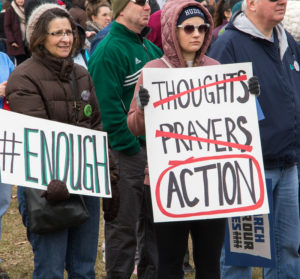
March For Our Lives rally, Columbus, Ohio, 2018
President Joe Biden took several significant executive actions yesterday to combat gun violence. In a White House Rose Garden ceremony, Biden, along with U.S. Attorney General Merrick Garland, announced that he is:
-
- Directing the Department of Justice (DOJ) to propose regulations to stop the proliferation of deadly, untraceable “ghost guns”;
- Modifying federal grant programs to increase available funding for community violence intervention programs;
- Publishing a model state “red flag” law (which would permit families or law enforcement to petition courts to remove guns from someone who poses a threat to themself or others);
- Directing DOJ to issue a new, annual comprehensive report on firearms trafficking;
- Directing DOJ to propose a regulation ensuring the stabilizing arm braces that circumvent the law on dangerous short-barrel rifles are subject to the National Firearms Act;
- Nominating David Chipman, a former special agent for the Bureau of Alcohol, Tobacco, Firearms and Explosives (ATF) and longtime gun owner and gun safety expert, to be the director of the ATF.
Vice President Kamala Harris began the event, expressing empathy by talking about seeing “what a bullet can do to the body” and about the trauma of families losing parents, children, or both to gun violence. Harris also used a popular and effective Democratic phrase for what the Biden administration seeks: “reasonable gun safety laws.”
President Biden then spoke, saying that “gun violence in this country is an epidemic and it’s an international embarrassment.” Biden stated that “the gun crisis … is actually a public health crisis.” Biden stressed, however, that “nothing I’m about to recommend in any way impinges on the Second Amendment.” President Biden also spoke about families losing loved ones to gun violence, from the authoritative viewpoint of someone who has lost three immediate family members, including two of his children.
Anti-gun violence groups such as Everytown for Gun Safety and the Brady Campaign were quick to praise President Biden’s executive actions. Likewise, some notable attendees were at the White House event to show support, including Fred Guttenberg, whose daughter Jaime was murdered at the Marjory Stoneman Douglas High School in Parkland, Florida in 2018. Fred has become an outspoken gun safety advocate since his daughter’s murder. Also in attendance was former Congresswoman Gabby Giffords, who was targeted and shot, along with others, in 2010 after Sarah Palin released an ad with gun scope crosshairs on a map of the U.S. featuring the districts of Giffords and other Democratic members of Congress.
President Biden’s executive power, however, is limited in the area of gun violence, as in most other areas. As Biden indicated, the biggest changes to reduce gun violence, such as universal background checks (including closing the loopholes for online and gun show sales), a renewed Assault Weapons Ban, and terminating the gun manufacturers’ immunity from lawsuits, would require federal legislation. Republicans in the evenly divided U.S. Senate would be sure to filibuster such bills, almost guaranteeing that they won’t pass, given the 60 vote threshold required to overcome the filibuster rather than a simple majority of 51 votes. As with other issues, therefore, if progress truly is to be made on gun violence, Senate Democrats must eliminate or at least toughen up the filibuster rule, a relic of America’s undemocratic and often violent past.
Photo by Becker1999 (Paul and Cathy), used under Creative Commons license. https://is.gd/TtatuB


